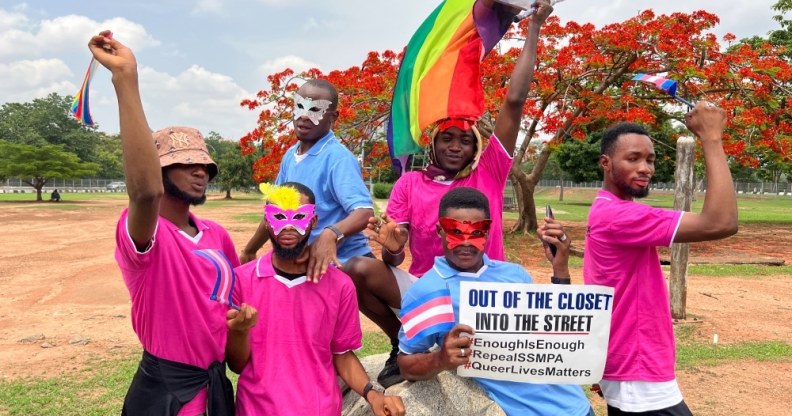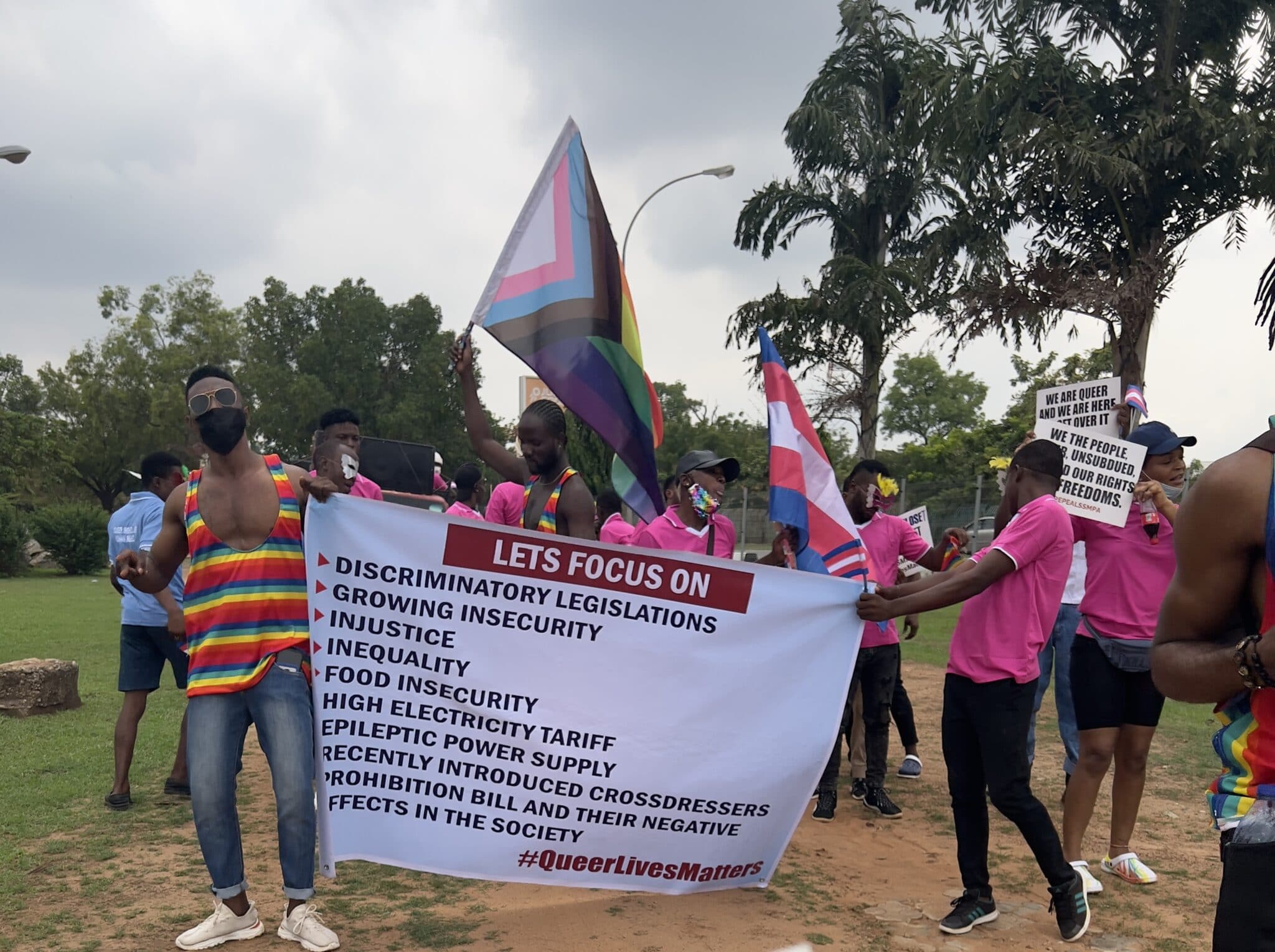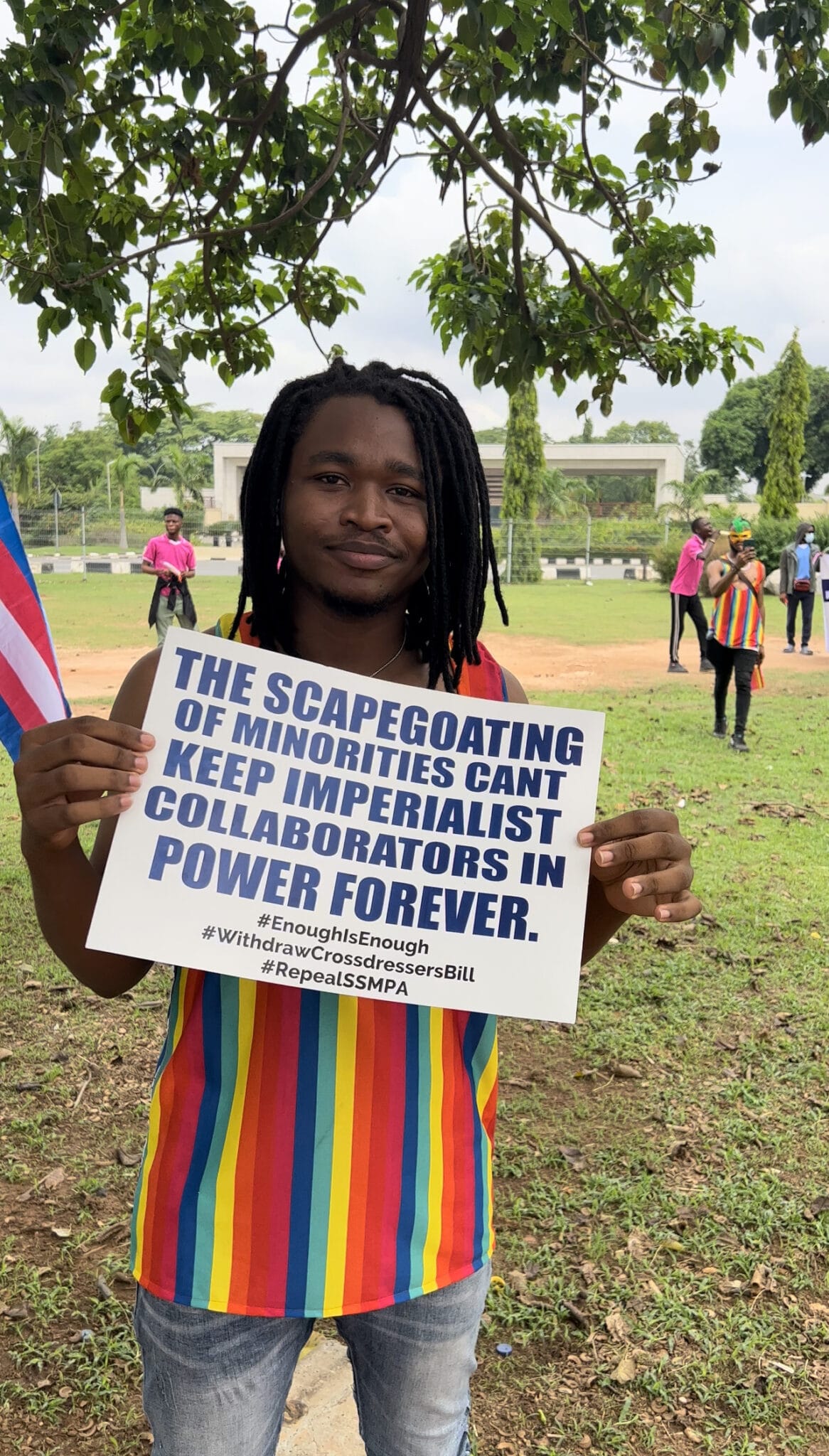Queer Nigerians stage defiant protest as government tries to ban ‘crossdressing’

LGBT+ people staged a protest against a reviled bill that would ban “crossdressing” in Nigeria. (Ani Kayode)
Around 50 LGBT+ activists took to the streets of Abuja, Nigeria, to protest a reviled bill that would make “crossdressing” illegal.
The bill, which seeks to amend a 2013 act banning same-sex marriage, would result in queer people who dress outside of expected gender norms imprisoned for up to six months or slapped with a hefty fine. Activists are particularly concerned for the welfare of Nigeria’s trans community if the law comes to pass.
Worryingly, the bill prohibits “crossdressing” in both private and public spaces – the only exemption is for “cross-dressing in the course of a stage play or any bonafide public entertainment”.
The “crossdressing” bill still has a number of stages to go through before it’s passed into law, but activists are already speaking out against it and showing their fierce opposition to a law that would further criminalise and marginalise their community.
LGBT+ Nigerians could lose their jobs and homes if ‘crossdressing’ bill is passed
Protesters gathered in Abuja, Nigeria, on Sunday (1 May) to protest against the much-maligned bill. In video footage shared on social media, LGBT+ activists can be seen dancing, playing music and waving trans and Pride flags.
Others can be seen wearing T-shirts emblazoned with messages of support for the LGBT+ community, such as “trans lives matter” and “queer rights are human rights”.
Activists also held a banner that urged Nigeria’s politicians to focus on real issues, such as injustice, inequality and food insecurity.

LGBT+ people staged a protest against a reviled bill that would ban “crossdressing” in Nigeria. (Ani Kayode)
Ani Kayode Somtochukwu was just one of the 50 or so people who turned up in Abuja to protest against the bill on Sunday. He is profoundly concerned about the wide-reaching impacts the bill will have if it’s passed into law.
“People will lose their jobs, they will have their lives put in danger, they might have to move, their landlords might kick them out because there are no discrimination protections for queer people in Nigeria,” Ani told PinkNews.
“If this law actually passes, it will increase levels of violence and it will encourage prejudice and discrimination from our family members and in the workplace.”
We just started the March! This is the first open queer protest in Nigeria!
Retweet! #EndCrossdressersBill#RepealSSMPA#EnoughIsEnough#QueerLivesMatter #WithdrawCrossdressersBill #QueerLiberationNow pic.twitter.com/9qgQ9SoR6l
— For Fags Sake!? #RepealSSMPA (@vicw0nder) May 1, 2022
Ani and other protesters decided that they needed to stage a protest in the country’s capital city to show the world that queer Nigerians like them exist – and that they won’t be cowed by efforts to silence them.
“We needed people to be able to see us in the actual flesh, that we are actually here demanding our rights,” he said.
“There is always this narrative that we don’t actually exist, that we’re just a few voices on Twitter or Instagram, That’s just an erasure of the Nigerian consciousness, so it was very important for us to come out and show that we actually exist and stake our claim to Nigeria because there’s always this discourse that queerness isn’t African.”
My DMs were overwhelmed with messages from people telling me that they would kill me.
Protesting and being visible as a queer person doesn’t come without consequences – since Ani shared pictures and videos online of the protest, he has received death threats and violent messages from complete strangers who hate him simply because of who he is.

Ani Kayode holding a placard at a protest in Nigeria. (Provided)
“My DMs were overwhelmed with messages from people telling me that they would kill me, that they would beat me until I couldn’t move and then they would hand me to the police,” Ani said.
“We want to take action. I really hope that with this protest people will come to the realisation that if we don’t actually fight for queer liberation, it’s just not going to happen.”
Nigeria’s anti-LGBT+ laws are rooted in colonialism
The “crossdressing” bill, if passed, would make an already legally complicated situation even worse for Nigeria’s embattled LGBT+ community.
Homosexuality is illegal in Nigeria and queer people have no legal protection against discrimination. In 2013, Nigeria’s parliament formally banned same-sex marriage and introduced criminal penalties for those who marry somebody of the same sex.
As is the case in many African countries, Nigeria’s ban on homosexuality originated as a colonial-era law imposed under British rule.
The country achieved independence in 1960, but the legacy of colonialism still stands tall for LGBT+ activists fighting for a better future.

